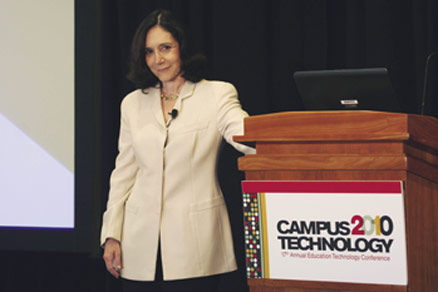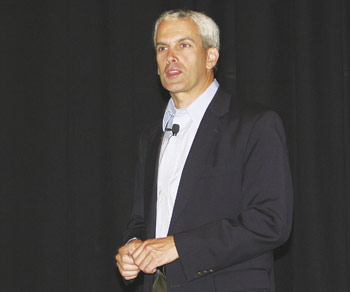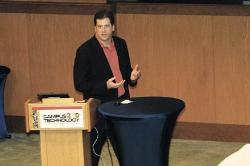Campus Technology - Compelling Keynotes
Distinguished thought leaders set the stage for discovery with enlightening general session keynotes, which inspired attendees to envision and prepare for the future.

Sherry Turkle, MIT
CT2010’s opening keynote, “Technology as the Architect of Self: Implications for Higher Education,” was given by Sherry Turkle, a professor in the Program in Science, Technology, and Society at MIT and the founder and current director of the MIT Initiative on Technology and Self.
Turkle’s keynote zoomed in on the effects of connectivity technologies, especially those that foster an “always-on/always-on-you” environment: virtual worlds, computer games, e-mail, text messaging, and social networking sites. Turkle spoke of “connectivity and its discontents,” offering attendees a set of caveats and questions to think about, “in the spirit of getting us organized to make technology closer to answering our human purposes: to use technology as an opportunity to ask about our human and our educational purposes, and really turn it to those purposes.”

Stephen Laster, Harvard Business School
The second day’s keynote, “The Road Ahead: Driving Innovation in the New Normal,” given by Stephen Laster, chief information officer at Harvard Business School (MA), was an hour-long catharsis not only for technology leaders trying to cope with tight budgets and shifting expectations on campus, but also for those seeking new pathways to innovation and opportunities for growth and change in education technology, even during challenging times.
Laster is a keen observer of higher education technology organizations and thinks deeply about the roles of those who leverage technology on campus for instruction, research, and administration. Most CT2010 attendees are in one of those roles, feeling the full force of the “new normal”—the expectation that they will do more with less within a changing organization—and its impact on their ability to innovate or even work effectively. According to Laster, the coming months for IT leaders may represent a wave of anxiety, or a wave of opportunity. He offered eight “factors for success” to help attendees think in news ways about the challenges of their jobs, which increasingly are more about people and less about technology. (Coming soon: Laster will pen a series of columns for CT offering practical advice on how higher ed CIOs can survive in today’s “new normal.”)

Josh Baron, Marist College
Capping the conference on its last day, Josh Baron took intrepid attendees on an epic tour of things to come with his keynote, “The Ed Tech Journey and a Future Driven by Disruptive Change.” As director of academic technology and e-learning at Marist College (NY) and board chair of the Sakai Foundation, Baron is on the lookout for something he says we haven’t seen in recent times: truly “disruptive” change in higher education; applications of technology that will contribute to fundamental changes in higher education institutions and in teaching and learning at the higher education level. (An excerpt from Baron’s keynote begins on page 40.)4
The $150, $200 textbook model is simply unsustainable, and we are going to see that model fall apart. One of the consequences will be the collapse of the traditional publishing industry model.